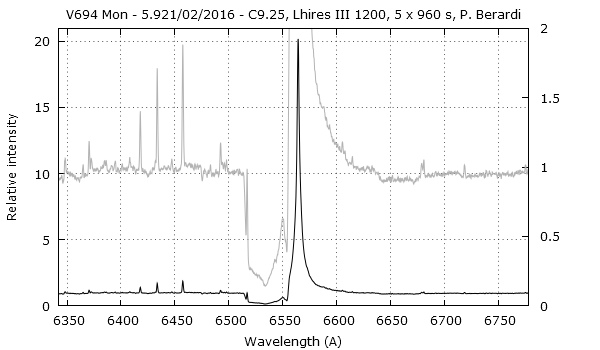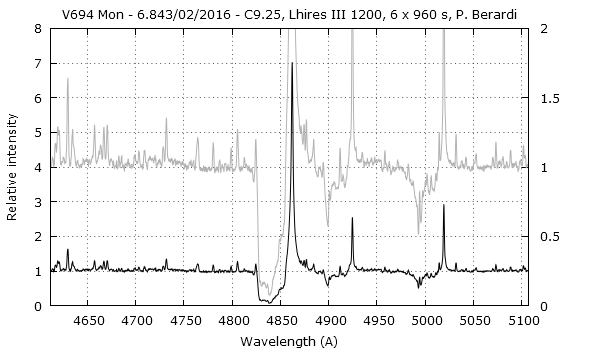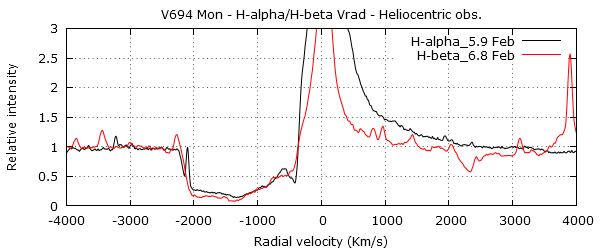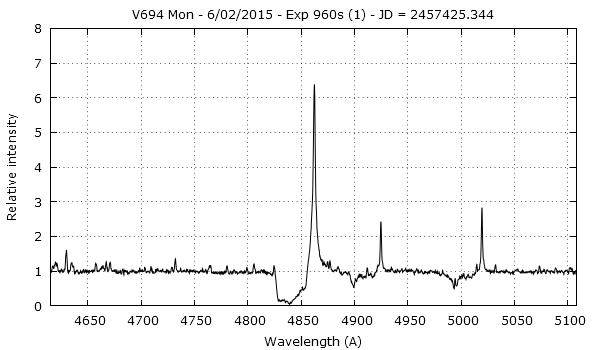v694 Mon
-
Francisco Campos
- Posts: 88
- Joined: Sun Nov 29, 2015 10:13 pm
v694 Mon
Bonsoir,
dans le forum AAVSO on announce que la variable symbiotique v694 Mon est en éruption. Je suis en train d'acquirer un spectre où je vois des fortes profiles P.Cygni dans toutes les bandes de Balmer.
Bien cordialement
Fran
dans le forum AAVSO on announce que la variable symbiotique v694 Mon est en éruption. Je suis en train d'acquirer un spectre où je vois des fortes profiles P.Cygni dans toutes les bandes de Balmer.
Bien cordialement
Fran
-
David Boyd
- Posts: 164
- Joined: Wed Dec 11, 2013 5:50 pm
Re: v694 Mon
Here is a spectrum of V694 Mon taken last night 3rd February starting at 22.00 UT. Its magnitude measured simultaneously with the spectrum and used to flux calibrate was V=9.12, almost 0.4 mag brighter than 2 weeks ago. There are strong P-Cygni profiles on all Balmer lines reaching a blue-ward extent on H-alpha of ~2500 km/s relative to the peak of emission. Spectrum sent to the database.
David
David
-
Martin Dubs
- Posts: 144
- Joined: Fri Jan 06, 2012 9:16 pm
- Location: Maienfeld, Switzerland
Re: v694 Mon
Hello,
I tried to download a spectrum from http://www.astrosurf.com/aras/Aras_Data ... iotics.htm,
but the links on that page do not work (local computer of Francois). Other links to Novae etc. work without problem. Please check.
Regards, Martin
I tried to download a spectrum from http://www.astrosurf.com/aras/Aras_Data ... iotics.htm,
but the links on that page do not work (local computer of Francois). Other links to Novae etc. work without problem. Please check.
Regards, Martin
-
Francisco Campos
- Posts: 88
- Joined: Sun Nov 29, 2015 10:13 pm
Re: v694 Mon
Hi,
the promised spectrum taken yesterday. The resolution is not as good as David one's (good job!), but happy to see how the DADOS works:
I have calculated Doppler shifts for the main Balmer bands, but my results are considerably lower than David one's: 1300-1600 km/s. Difficult to measure, due to the very broad absortion peak.
Greetings
Fran
the promised spectrum taken yesterday. The resolution is not as good as David one's (good job!), but happy to see how the DADOS works:
I have calculated Doppler shifts for the main Balmer bands, but my results are considerably lower than David one's: 1300-1600 km/s. Difficult to measure, due to the very broad absortion peak.
Greetings
Fran
-
umberto sollecchia
- Posts: 247
- Joined: Tue Dec 30, 2014 3:25 pm
Re: v694 Mon
Bonjour à tous, voici ma contribution.
cordialement Umberto
cordialement Umberto
-
Paolo Berardi
- Posts: 578
- Joined: Thu Sep 29, 2011 10:51 pm
Re: v694 Mon
Fran, thank you for reporting the outburst. My observations for February 2016, 5 and 6. H-alpha and H-beta. Lhires III 1200 & C9.25.
H-alpha region:

H-beta region:

Radial velocity of heliocentric corrected profiles (note there is a day apart):

With reference to classification by Iijima (2002), see ARAS Eruptive Stars Information letter n. 11 30/11/2014, it seems that at present there is no flat continuum between the absorption and emission components of H-beta line and the red side of absorption isn't steep. Furthermore, the blu-shifted absorption does not reach high velocities observed during the active stage. This should indicate that currently the star is in the stable stage (type A). Is it possible? I read that sometime the active stage occours without significant brightening in the V band, so the events are not always related.
Paolo
H-alpha region:

H-beta region:

Radial velocity of heliocentric corrected profiles (note there is a day apart):

With reference to classification by Iijima (2002), see ARAS Eruptive Stars Information letter n. 11 30/11/2014, it seems that at present there is no flat continuum between the absorption and emission components of H-beta line and the red side of absorption isn't steep. Furthermore, the blu-shifted absorption does not reach high velocities observed during the active stage. This should indicate that currently the star is in the stable stage (type A). Is it possible? I read that sometime the active stage occours without significant brightening in the V band, so the events are not always related.
Paolo
-
Peter Somogyi
- Posts: 420
- Joined: Sun Jul 13, 2014 8:56 am
Re: v694 Mon
I was shooting it with Paolo in parallel on Feb-6 night at H-beta with 600/mm grating + 35um slit (somehow my coverage is also similar), but I was hunting for short-term changes, with per-exposure calibration before/after (using 2 ref. stars). First 2 x 20 minute were continuous, then the next 3 ones was 1 x 20 minute per each (shooting other targets in between), normalized for 4600-4800A:
It tells H-beta was definitely increasing, and maybe some other lines suspected for variation.
The velocities did not seem to change at this resolution, remained very much the same as Paolo published at H-beta.
Happy hunting!
- Peter
It tells H-beta was definitely increasing, and maybe some other lines suspected for variation.
The velocities did not seem to change at this resolution, remained very much the same as Paolo published at H-beta.
Happy hunting!
- Peter
-
Paolo Berardi
- Posts: 578
- Joined: Thu Sep 29, 2011 10:51 pm
Re: v694 Mon
Hi Peter, that is very interesting. The emission growth (H-beta peak and EW) is also discernible on my spectra from 6.843 to 6.888 Feb 2016 (a shorter period):

Paolo

Paolo
-
umberto sollecchia
- Posts: 247
- Joined: Tue Dec 30, 2014 3:25 pm
Re: v694 Mon
Bonjour à tous, placez le profil d'observation de 11/02/2016.
Cordialement Umberto
Cordialement Umberto
Last edited by umberto sollecchia on Sun Feb 14, 2016 12:50 pm, edited 2 times in total.
-
Peter Somogyi
- Posts: 420
- Joined: Sun Jul 13, 2014 8:56 am
Re: v694 Mon
Quick result from yesterday:
LHires III/600/35um/ATIK 414/25cm All the 3 calibrations (ref.star/ArNe/flat) taken twice before and after again.
It is interesting that H-beta absorption had almost unchanged, while the multiplet to the right seemingly broadened by their absorb feature (look at the 3 peaks to the right)!
Does anybody know the name of that multplet?
/ Peter
LHires III/600/35um/ATIK 414/25cm All the 3 calibrations (ref.star/ArNe/flat) taken twice before and after again.
It is interesting that H-beta absorption had almost unchanged, while the multiplet to the right seemingly broadened by their absorb feature (look at the 3 peaks to the right)!
Does anybody know the name of that multplet?
/ Peter